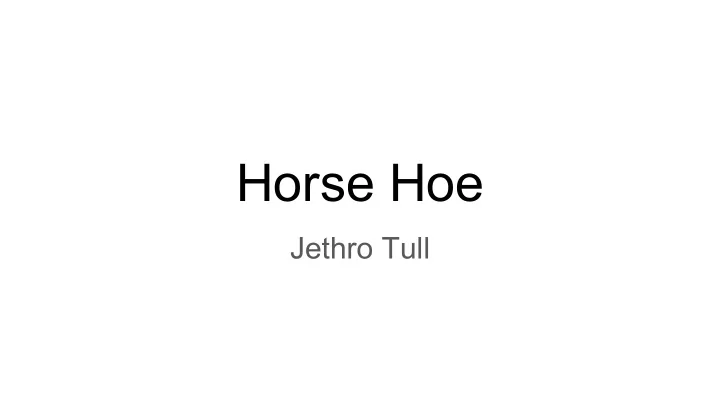

Horse Hoe Jethro Tull
Short Biography Tull was born in Basildon, Berkshire and baptized on March 30 1674. He studied at Oxford and originally planned to have a political career, but then became a farmer as his father before him.
The Agriculturist Jethro Tull considered earth to be the sole food of plants. "Too much nitre," Tull tells us, "corrodes a plant, too much water drowns it, too much air dries the roots of it, too much heat burns it; but too much earth a plant can never have, unless it be therein wholly buried. In his travels, Tull found himself seeking more knowledge of agriculture. Influenced by the early Age of Enlightenment, he is considered to be one of the early proponents of a scientific approach to agriculture. He helped transform agricultural practices by inventing or improving numerous implements. In Europe he compared the agriculture of France and Italy with the one in England. Upon his returned he purchased a farm named Prosperous in Berkshire where he wrote his Horse-hoe Husbandry.
The Horse Hoe Jethro Tull designed the horse drawn hoe. He described the methods of his invention in his book “Horse-Hoeing Husbandry.” His design pulled out weeds and other unwanted shrubs, and left them on the surface to die. Tull’s methods were initially subjected to violent attack, but they were eventually adopted by the large landowners and laid the basis for more modern and efficient British farming.
“To the memory of Jethro Tull. Pioneer of mechanized agriculture. Author of Horse-hoe Husbandry. Baptized in this church 30th March 1674, buried here 9th March 1740” His gravestone at St. Bartholomew’s graveyard. Jethro Tull’s designs changed the agricultural world forever. Though his designs are not seen in their entirety today, there are still small traces of them found in modern machinery.
The End GONZALO VAZQUEZ AVILA
Recommend
More recommend